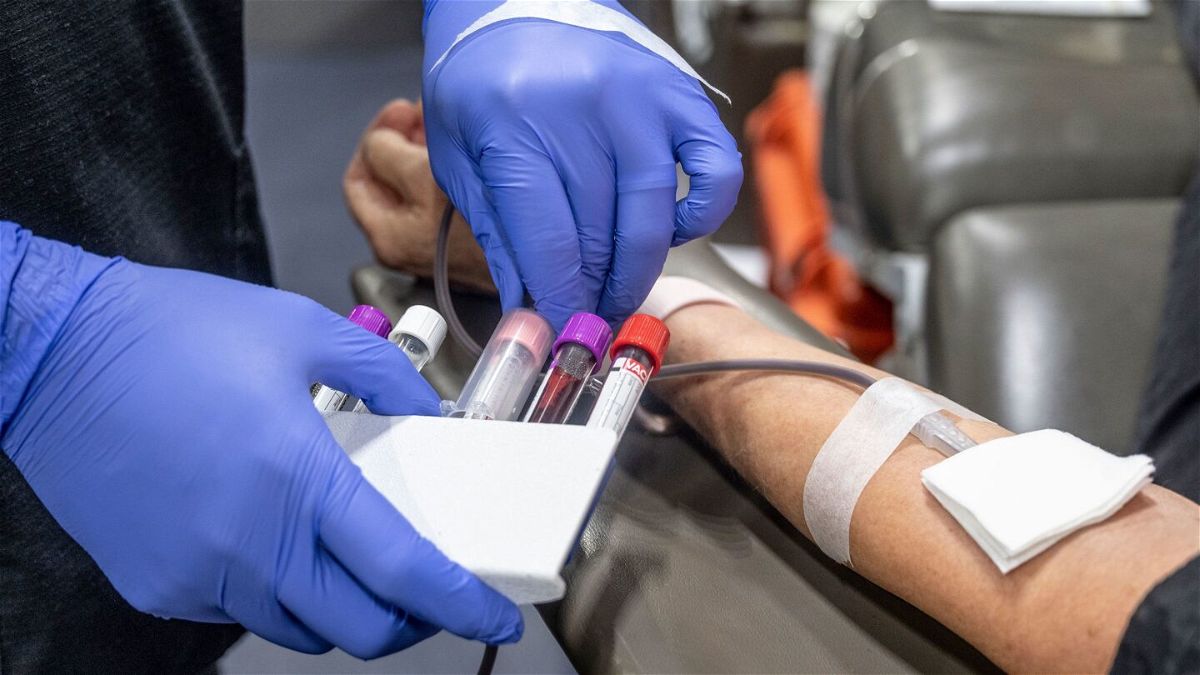More gay men can give blood as ‘one of the most significant changes in blood banking history’ gets underway

A nurse fills test tubes with blood to be tested during an American Red Cross bloodmobile in Fullerton
By Jen Christensen, CNN
(CNN) — Back when Kody Kinsley was in high school, he was so dedicated to boosting the US blood supply that he helped run blood drives. But Monday will be the first time as an adult that Kinsley — now the secretary of North Carolina’s Department of Health and Human Services — will actually be allowed to donate blood.
“I’m excited that I’ll get to play my small part,” he said.
Kinsley is gay. Although the rules have loosened some, for nearly 40 years, guidance from the US Food and Drug Administration banned most gay men from donating blood, even if they personally posed no threat to the blood supply.
Starting Monday, the Red Cross, the organization that provides about 40% of US blood and blood components, will use a more inclusive risk-based individual assessment to determine whether someone is eligible to give blood, regardless of their sexual orientation.
The change is “massive,” Kinsley said. The old guidance stigmatized men like him.
“It’s really not people that are at risk,” he said. “It’s about certain behaviors.”
In January 2022, when North Carolina was facing an unprecedented shortage of blood, Gov. Roy Cooper donated to raise awareness, and staff approached Kinsley to do the same.
“But I had in that moment a conversation I’ve had many times in my life, which is explain to people why I can’t take part in this community service to others because of a stigma-based policy that the FDA has maintained for 40 years,” Kinsley said.
The policy was created early in the AIDS epidemic, when the US surgeon general estimated that 70% of people with HIV were gay or bisexual men. At the time, blood could be screened for HIV antibodies, but the test wasn’t perfect and could not catch every HIV infection.
Over the years, blood banks became better able to screen for HIV among gay and bisexual men, but the FDA policy stayed the same. Rather than screen people out for risky behavior, it screened people for who they were.
Initially, gay and bisexual men who had sex with men were banned for donating for life. Over the years, the ban eased a little but still excluded most gay men from donating.
On May 11, the FDA’s guidance caught up to the science, at least for the most part. Risk is assessed based on behavior rather than on orientation. Some gay men will still be excluded, even with the update, but the FDA touted the change as a “significant milestone for the agency and the LGBTQI+ community.”
“The Red Cross believes this is one of the most significant changes in blood banking history,” said Rodney Wilson, a senior biomedical communications specialist with the Red Cross. “It makes blood donation more inclusive, and it also keeps the blood supply safe.”
The Red Cross says the new guidance should make nearly everyone feel welcome.
“We know that, for many decades, the FDA’s policies have obviously caused a lot of hurt to the LGBTQ community. And we recognize that, and we regret that that has been the case. But what we want people to know is that everyone is welcome in our mission, whether you can give blood or not,” Wilson said.
Change coming to more blood banks
The United Kingdom and Canada had adopted more inclusive donor policies without a problem. In the US, the Red Cross is not the first blood bank to make the change.
It’s up to individual blood centers to decide whether and when they want to make it. Some small blood centers were able to make the change quickly, according to America’s Blood Centers Chief Medical Officer Dr. Jed Gorlin. His group is the national organization for independent community-based blood centers.
Most centers, he said, needed a few months to update computer systems and do training.
“It takes some sensitivity training to make sure it’s rolled out in a sensitive and appropriate fashion,” Gorlin said. Most people will fill out the risk assessment electronically, “but if the computer goes down, you need staff to be ready to ask questions about anal sex without batting an eyelash,” he said.
Gorlin thinks most centers will start using the new risk assessment before the end of the year.
“I think this is a very reasonable and prudent step going forward,” he said.
OneBlood, an Orlando-based nonprofit that sends blood to hundreds of hospitals, mostly in the South, will start using the more inclusive risk assessment August 21, according to Susan Forbes, senior vice president of corporate communications and public relations.
Forbes said the change is a welcome one. She remembers the agony gay men felt after the 2016 mass shooting at the Pulse gay nightclub. After 49 people were killed and 53 wounded, hundreds of people waited in line for hours to donate blood. Gay men were not allowed to help.
“It was hard to see people show up who wanted to donate and were unable to because of the previous policy,” Forbes said. “Now, fast-forward seven years later, to have everybody answer the same set of questions to determine eligibility to donate blood is really a huge step in the right direction.”
New York Blood Center said it would welcome all eligible donors using the new risk assessment on September 18. The organization said that “for decades,” it has “strongly” advocated for scientifically based changes to the FDA policy about men who have sex with men. “We applaud the FDA’s final guidance that establishes a blood donor screening process based on Individual Donor Assessment, not sexual or gender identity,” New York Blood Center said in an email to CNN Friday.
Critics say it’s not enough
Only about 3% of Americans donate blood, studies show, and there are often shortages over the summer and the holidays.
Jason Cianciotto, vice president of communications and policy at GMHC, the world’s first HIV/AIDS service organization, said that the US should have even more donors but that the FDA’s new guidance doesn’t go far enough.
“There are a signficant proportion of LGBT people, particularly gay and bisexual men who have sex with men, who still will be excluded from donating blood, and they shouldn’t be,” he said. “This change still perpetuates the stigma and harm that the FDA policy has fomented for so many years.”
The updated guidance says anyone who has had a new sexual partner, more than one sexual partner in the past three months, and anal sex in the past three months, would be deferred. The FDA said it believes that using the three-month benchmark reduces the risk of getting a donation from someone with a recent HIV infection that may not know it yet, even if they’ve been tested. But the guidance doesn’t take into account people who should be safe if they are using condoms in such situations, Cianciotto said.
People who are taking medicine like pre-exposure prophylaxis (PrEP) and post-exposure prophylaxis (PEP) are also being deferred under the current policy. The FDA believes that while the medicines are safe and effective, they might cause an HIV test to show up as negative even if there is actually an infection. The new guidelines have people wait three months after their last PrEP pill, or two years if they had a long-acting PrEP injection.
Cianciotto said this guidance confuses the government’s other messages that encourage people to use PrEP.
“It’s perfectly reasonable for an individual to think, ‘OK, well, I’m taking PrEP, and I’m told that that makes it nearly impossible for me to contract HIV, and I’ve been taking it as has been prescribed, and I’ve been going to my doctor’s appointment, and that means I’m getting HIV tested at least four times a year, as well as testing for other STIs. So I know more about my health than many other people who aren’t taking PrEP, and now I can finally donate,’ and they’re going to get there, and they’re going to find out they can’t,” Cianciotto said.
Cianciotto remembers all too well the humiliation he felt when he first went to give blood in high school and got to the part of the risk assessment that told him he couldn’t donate if he had sex with any man.
“If there was a camera watching right then, my jaw would have dropped,” he said. “It reinforced that harmful stereotype that I had been told in my church and by my parents, that if I chose to be gay, I would be alone all my life, and eventually I would get AIDS and die. That was the message that the FDA was reinforcing to me at a very vulnerable time in my life at a young age.”
Cianciotto said he now has a 17-year-old son who is gay, and if he were to go to a similar blood drive, “he could very easily be excluded.”
“We raised him in a no-shame, nonstigmatized household, yet here he may be denied donating,” Cianciotto said.
The FDA said it will continue to evaluate that policy.
The Red Cross said that while it will celebrate the new FDA guidance, it knows the guidance is “not perfect.”
“There’s still work that can be done to make blood donation even more inclusive,” Wilson said. The Red Cross will work with the FDA to gather more data, particularly about people on PrEP and PEP.
“Hopefully, in time, we’ll be able to eliminate that deferral, as well,” Wilson said.
Wilson hopes the current policy will encourage more people to donate. He said a number of gay men already signed up to donate Monday.
Kinsley hopes he will be one of the first.
“To have someone excluded based off of a policy rooted in stigma from 40 years ago and not updated is, frankly, it hurts the community, and it lowers people’s confidence in the overall process in our commitment to one another,” Kinsley said. “I hope that gay men that are eligible to donate come forward for this.”
“I hope that we can use this moment to really educate the broad base of people who can donate about how important it is,” he added. “There’s no substitute for blood.”
The-CNN-Wire
™ & © 2023 Cable News Network, Inc., a Warner Bros. Discovery Company. All rights reserved.

